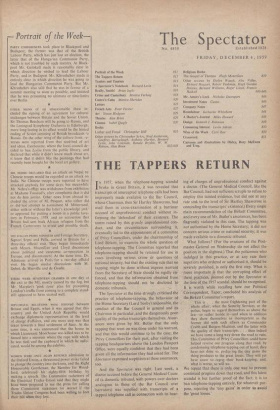THE TAPPERS RETURN
N 1957, when the telephone-tapping scandal
I
broke in Great Britain, it was revealed that transcripts of intercepted telephone calls had been improperly made available to the Bar Council, whose Chairman, then Sir Hartley Shawcross, had used them in cross-examination of a barrister accused of unprofessional conduct without in- forming the 'defendant' of their existence. The storm raised by this grossly unprofessional con- duct, and the circumstances surrounding it, eventually led to the appointment of a committee of Privy Councillors, under the chairmanship of Lord Birkett, to examine the whole question of telephone-tapping. The Committee reported that telephone-tapping should be retained for use in cases involving serious crime or questions of national security, but that the existing rule that no tapping might be done without express warrant from the Secretary of State should be rigidly en- forced, and that the information obtained from telephone-tapping should not be disclosed to domestic tribunals.
The Spectator at the time strongly criticised the practice of telephone-tapping, the behaviour of the Home Secretary (Lord Tenby) responsible, the conduct of the Bar Council in general and its Chairman in particular; and the dangerously poor quality of the police transcripts themselves. Assur- ances were given by Mr. Butler that the only tapping that went on was done under his warrant, and that this would continue to be the case; the Privy Councillors for their part, after visiting the tapping headquarters above the London Passport Office, were equally confident that they had been given all the information they had asked for. The Spectator expressed scepticism at these assurances, too.
And the Spectator was right. Last week, a doctor accused before the General Medical Coun- cil (a domestic tribunal, with powers over doctors analogous to, those of the Bar Council over barristers) was supplied with transcripts of a tapped telephone call in connection with its hear- ing of charges of unprofessional conduct against a doctor. (The General Medical Council, like the Bar Council, had not sufficient scruple to refuse to employ this tainted evidence, but did not at any rate sink to the level of Sir Hartley Shawcross in concealing the transcripts' existence.) Every single main recommendation of the Birkett Committee, and every one of Mr. Butler's assurances, has been flagrantly violated in this case. The tapping was not authorised by the Home Secretary; it did not concern serious crime or national security; it was made available to a domestic tribunal.
What follows? (For the evasions of the Post- master-General on Wednesday do not affect the position in the slightest.) That the policemen who indulged in this practice, or at any rate their superiors who ordered or authorised it, should be severely punished, is only the first step. What is more important is that the corrupting effect of these practices, pointed out by the Spectator at the time of the 1957 scandal, should be recognised. It is worth while recalling how our Political Correspondent, Taper, concluded his analysis of the Birkett Committee's report.
This is . . the most frightening part of the whole affair; when the Security Services, or the police, begin to regard themselves as above the law—or rather beside it—and when in addition they show themselves as incompetent as the former did with such affairs as Commander
Crabb and Burgess-Maclean, and the latter with the quality of their transcripts . . . then indeed we have come a long way down the road to ruin. This Committee of Privy Councillors could have helped reverse our progress along that road, by condemning telephone-tapping out of hand; they have not done so. preferring the tiny gains the thing produces to the great losses. They will yet have cause to regret their book-keeping; and, what is worse, so will we.
We repeat that there is only one way to prevent continued progress down that road, and this latest scandal is but further proof of the fact; it is to ban telephone-tapping entirely, for whatever pur- pose, rejecting the 'tiny gains' in order to avoid the 'great losses.'














































 Previous page
Previous page